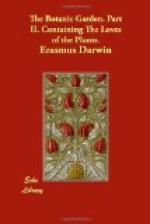“We are told in our new Alcoran, that, above an hundred years ago, the country around the tree was inhabited by a people strongly addicted to the sins of Sodom and Gomorrha; when the great prophet Mahomet determined not to suffer them to lead such detestable lives any longer, he applied to God to punish them: upon which God caused this tree to grow out of the earth, which destroyed them all, and rendered the country for ever uninhabitable.”
Such was the Malayan opinion. I shall not attempt a comment; but must observe, that all the Malayans consider this tree as an holy instrument of the great prophet to punish the sins of mankind; and, therefore, to die of the poison of the Upas is generally considered among them as an honourable death. For that reason I also observed, that the delinquents, who were going to the tree, were generally dressed in their best apparel.
This however is certain, though it may appear incredible, that from fifteen to eighteen miles round this tree, not only no human creature can exist, but that, in that space of ground, no living animal of any kind has ever been discovered. I have also been assured by several persons of veracity, that there are no fish in the waters, nor has any rat, mouse, or any other vermin, been seen there; and when any birds fly so near this tree that the effluvia reaches them, they fall a sacrifice to the effects of the poison. This circumstance has been ascertained by different delinquents, who, in their return, have seen the birds drop down, and have picked them up dead, and brought them to the old ecclesiastick.
I will here mention an instance, which proves them a fact beyond all doubt, and which happened during my stay at Java.
In the year 1775 a rebellion broke out among the subjects of the Massay, a sovereign prince, whose dignity is nearly equal to that of the Emperor. They refused to pay a duty imposed upon them by their sovereign, whom they openly opposed. The Massay sent a body of a thousand troops to disperse the rebels, and to drive them, with their families, out of his dominions. Thus four hundred families, consisting of above sixteen hundred souls, were obliged to leave their native country. Neither the Emperor nor the Sultan would give them protection, not only because they were rebels, but also through fear of displeasing their neighbour, the Massay. In this distressful situation, they had no other resource than to repair to the uncultivated parts round the Upas, and requested permission of




